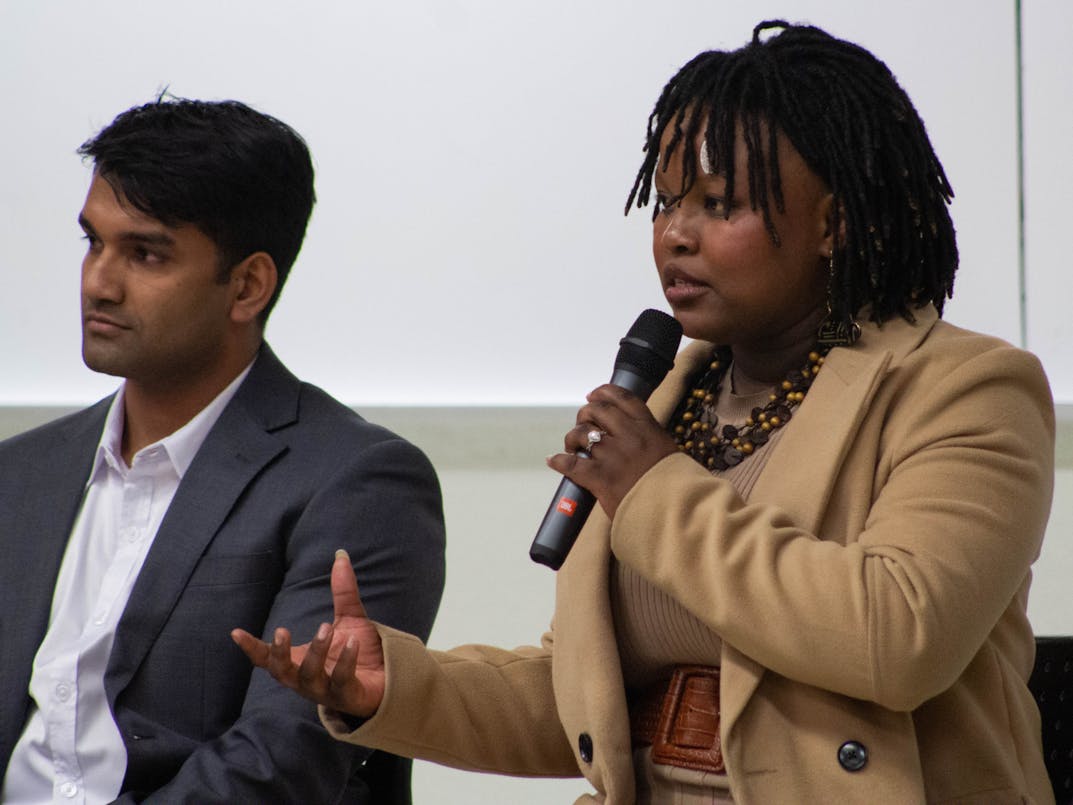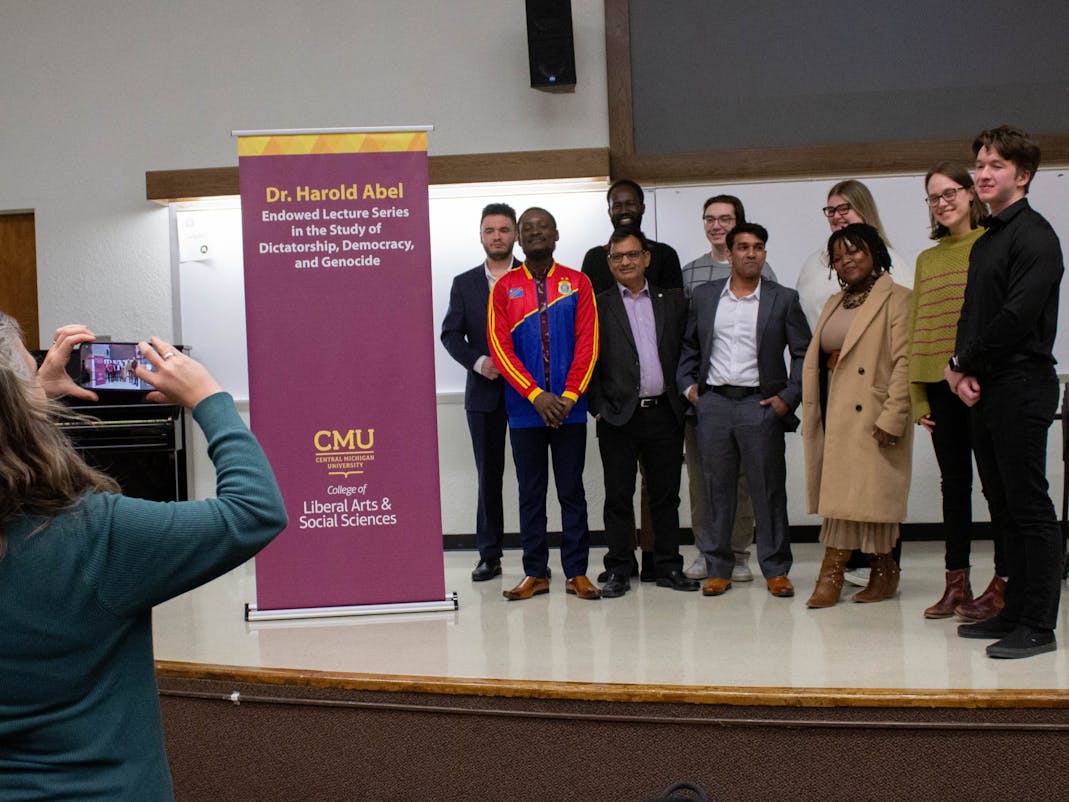‘Less talk, more action’: Educating on forced displacement experiences

Left to right; freshmen M’munga Lulaca, Shofi Alom, Shukurani Nsengiyumva, and Emily Worline speak on what brought them to be a panelist at the event, Wednesday, March 20, in Pearce Hall 127. Freshmen M’munga Lulaca is a student at CMU and states that “The life I’m living, I’m now able to learn, all thanks to the CMU.” (CM Life | Izzy Newton)
After leaving their home countries for the sake of their safety and survival, three forced migrant scholars journeyed beyond borders and sought a higher education.
Prakash Adhikari, the faculty advisor for the Refugee Outlook Collective (ROC) at CMU, said 110 million people are forcibly displaced from their homes as of mid-2023. Among this, 40% are children. This displacement is "a result of persecution, conflict, violence, human rights violations or events seriously disturbing public order," according to the UNHCR.
Adhikari said there are more displaced individuals than the total population of Canada and Australia put together, two of some of the biggest countries on Earth.
“They didn’t leave home because it’s fun,” Adhikari said. “They left because the alternative would have been death.”
ROC is an on-campus organization associated with a larger, multi-state nonprofit advocating for education access for forced-displacement individuals.
ROC organized a discussion panel with three migrant scholars: Shofi Alom, M’Munga Lulaca, Shukurani Nsengiyumva and the founder and executive director of ROC, Emily Worline, on Wednesday, March 20, at Central Michigan University.
The panel was sponsored by the Dr. Harold Abel Endowed Lecture Series in the Study of Dictatorship, Democracy and Genocide, the Critical Engagements initiative and ROC at CMU.
Their journey
Shofi Alom, a Rohingya refugee who arrived in the U.S. in 2016, said in 2015 when he was 12 years old, he fled his home country of Burma alone, seeking to reach Malaysia by boat.
“It’s very hard to leave the entire family back home and say goodbye,” Alom said.
However, he said he was unaware it was a human trafficking boat.
Alom said throughout his history there were many times he was almost killed. He ended up in a detention center orphanage before the United Nations helped bring him to the U.S.
In the detention center, Alom said he was given a small room with no sunlight where he couldn’t see anything for more than a year.
“What kept me going, I never lost my hope,” Alom said. “At some point, I almost gave up but I never gave up. … When I was in prison, I said to myself, ‘I have no vision, no hope, no life and I guess this is where I will spend the rest of my life.’”
Now, Alom is pursuing computer science and electrical engineering at Western Michigan University, and he said if it wasn’t for his foster families he wouldn’t be surviving and in college.
Shukurani Nsengiyumva, a Rwandan refugee who arrived in the U.S. in 2013, said she spent about 10 years in Malawi.

Left to right; Shofi Alom and Shukurani Nsengiyumva answer a question asked by attendees, Wednesday, March 20, in Pearce Hall 127. The question centered on how journalists should approach on respectfully asking about a refugee’s experiences, Nsengiyumva explained that it is best to give them space and time to understand what they have been through. (CM Life | Izzy Newton)
“I saw family members get resettled," Nsengiyumva said. "I saw neighbors get resettled and you know you get to see people getting this news and it’s like, when is it going to be my turn?”
As more years went by, Nsengiyumva said she felt Malawi was where she and her mom were settling and was losing her confidence in resettling again.
Nsengiyumva said her mom kept her kind of hopeful, with her confidence and faith because, as a teenager, she watched as her friends resettled and got opportunities to go to college.
She said while she was fortunate enough to go to school in Malawi, Looking at the political climate with limited educational resources, employment and income, Nsengiyumva said she worried about her status after school.
“If you get the means to go to college in Malawi, unfortunately, that does not necessarily mean you’re going to actually get a job or get the opportunities,” Nsengiyumva said.
She also said that going to school, people may need to go under a different name because they fear being recognized as refugees due to xenophobia.
“It was mostly just the confidence that my mom had that kept me going," she said. "As a kid I couldn’t see it, I didn’t believe it, until I was in New York.”
Now a graduate from Kalamazoo College, Nsengiyumva currently works as a Program Manager at the Alzheimer’s Association. She said a lot of the work she does with community outreach and supporting health equity stems from her experience.
M’Munga Lulaca, a refugee who fled from the Democratic Republic of the Congo, arrived in the U.S. in 2023.
His early years were lived on the road, shuffling from country to country. Lulaca said his family traveled to Tanzania, then back to his home country Congo and fled again to Malawi, where he stayed there for more than 10 years.
Lulaca said he got his education in Congo and worked as a teacher in the Dzaleka refugee camp in Malawi.
As a refugee, Lulaca said he’s experienced a lot of challenges in his life, but said he is dedicated and always wanted to go further with his education, although he didn’t have the necessities to do so. That was until he said he came upon Global Classroom, an ROC at CMU program that provides an opportunity for refugees to take classes, and he is currently a student at CMU.
Lulaca said what kept him going was his mom and dad. His dad was a teacher who taught him to work hard.
“Despite that we went through different challenges, different problems, he was always telling me to go on, never stop,” Lulaca said.
Challenges of a new home
Calvin Older, the treasurer of ROC at CMU, said that people should know that when someone finds refuge in another country, their problems don’t just end.
When it came to coming to the U.S., Lulaca and Alom both said that learning a new language was challenging.
Alom said he didn’t know how to speak English, let alone how to read or write in English. He said by being limited by a different language, he couldn’t express his thoughts and feelings.
“I had to start everything from scratch,” Alom said.
Alom also said it is challenging to worry about his family, as his parents are still in his home country facing genocide.
“Just recently my mom said, ‘If you don’t hear from us, then we are dead,’” Alom said. “I haven’t heard from her for the last three weeks and I don’t know if my family is still alive.”
The importance of education, support and action
Nsengiyumva said conversation and education are needed so people can know better and raise awareness. She also said it’s a way for people to escape reality and find hope.
“For me, personally, education was one of the ways that I saw a way out of the struggle,” Nsengiyumva said.
Alom said one of the first things that happened when the Rohingya nation was invaded in the late 1700s, was that their access to education was blocked. He said without education, individuals can be easily controlled.

Members of CMU’s ROC and the panelist pose together after the event, Wednesday, March 20, in Pearce Hall 127. ROC works with many universities such as CMU, MSU, Western, Wayne State, and ect. (CM Life | Izzy Newton)
“Education is a power over all things,” Alom said. “Without education, you’re blind, even though you have healthy eyes, or healthy vision.”
Lulaca said that education is a tool that can change the world.
“If the world is where it is today, it’s because of education, it’s because people (have) knowledge,” Lulaca said. “With our knowledge, we can do anything.”
Nsengiyumva said organizations need to tackle the root of the problem by doing more to challenge the politics that tackle the issue of forced displacement itself.
Alom said he hopes he can make changes for all his people, all the refugees and all the people around the world. He said he urges people to help prevent these atrocities.
“Less talk, more action,” Alom said.






